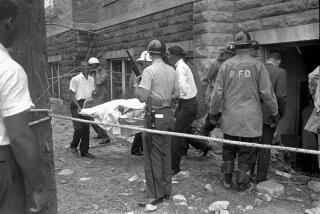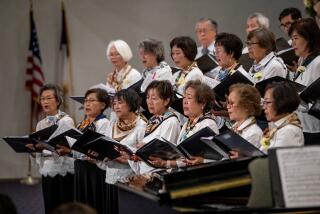No neighborly love for Soweto minister
- Share via
Reporting from Johannesburg, South Africa — If the gun hadn’t jammed 16 years ago, the Methodist minister would not be alive.
The messy chaos of refugees in his church in central Johannesburg would not exist. The crowd of people who sleep on the floor in his home would not have a place to lay their heads.
The poor who wait at his door until midnight, or 2 a.m. or even 5 a.m. to talk to him would not be there. Their terrible stories would not be listened to. And the Rev. Paul Verryn would not carry their pain.
But the gun did jam.
::
To neighbors of the Central Methodist Church, Verryn is a pest, like one of those old ladies who collects hundreds of stray cats and makes the neighborhood stink. But he takes in people.
Sometimes 3,000 Zimbabwean refugees sleep in his church. Most evenings, crowds loiter, carrying their lives in plastic bags, waiting to get inside for the night. The church, five stories tall, is crammed full by nighttime. Huddled, shapeless forms fill the stairways. There’s a constant shuffling hubbub, the occasional raucous shout.
When they bed down, Verryn carefully picks his way through, searching for places to step.
It lowers the tone of this already frayed downtown neighborhood, some think. Shopkeepers and local companies hate the chaos.
Verryn had death threats last April. Police arrested two men who admitted that local businessmen had paid them $4,000 to kill him, according to news reports.
In the center of downtown, Verryn’s church fuels angst over the massive influx of Zimbabwean refugees into South Africa in recent years. In xenophobic violence against foreigners in 2008, the church was attacked by mobs.
Gauteng province lawmakers threatened to close the church in October, calling it “a horror” and “a ticking time bomb.”
“If I could have it my way, I would close it down today,” Molebatsi Bopape, the chairwoman of the legislature’s health and social development committee, said at the time.
And now even his superiors have turned against him.
Verryn, whose 10-year term as the Methodist bishop of central Johannesburg ended in November, has been suspended from the church for talking to journalists and initiating court action, without permission, to appoint an independent curator to protect children at the church. Mediators will settle the matter.
His Soweto home is always crowded. Sometimes 20 people sleep on the floor, in spare rooms, on couches. Some have been there for years. Others come, hearing that he won’t turn them away. It’s like a comfortable old railway station, people sharing their stories between journeys.
“I feel sorry for homeless people. But then I go home,” said Mary Metcalfe, a friend who has known him since the 1980s. “Paul’s never learned that. He’s not going to have an empty room when there are people in need.
“His bedroom is his only private space,” said Metcalfe, who was one of the longtime confidants interviewed in place of Verryn, who cannot speak to journalists, his lawyers say, pending the hearing on his suspension. “The lounge, the dining room have people, because he would not be able to say, ‘I’m sorry for you,’ and then go home to an empty house.”
In 2005, Verryn told an interviewer that he sometimes regretted never marrying, but thought that his 21-hour workday would have been tough on a family. In any case, there’s no one else to burden when he takes in yet another person.
Metcalfe comes several evenings a week with supper and a piece of cake, knowing he wouldn’t eat otherwise.
He confessed a recent mistake to her over supper one evening. Arriving home late, he heard about a homeless Zimbabwean man living alone on the Soweto dump. He went there in the middle of the night, found the man and took him to his home, full of people as usual.
But it was too much for the homeless man, who’d been isolated and couldn’t cope with the crowd. He stayed a short time, then fled. When Verryn went to the dump searching again, he’d disappeared.
“Paul told me about this because he felt bad. In retrospect he might have found a different setting for the man,” Metcalfe said. “He felt critical of himself for not having been perceptive enough to realize.”
Verryn looks exactly as one would imagine an ordinary middle-aged cleric: average height, kindly eyes, spectacles, an open-necked shirt, gray beard and hair.
His appearance belies his courage. As an anti-apartheid activist, Verryn moved to Soweto in 1988 as minister, one of the few whites to live in the township. He often hid black activists in his home, including a tough 14-year-old boy named Stompie Seipei, an anti-apartheid activist who’d been jailed at 11.
Winnie Madikizela-Mandela, then-wife of jailed activist Nelson Mandela, lived in the area with her thuggish bodyguards known as the Mandela United Football Club.
The club abducted Seipei and three others from Verryn’s home, accused them of having sex with the minister, then beat and tortured them. According to South Africa’s Truth and Reconciliation Commission, Madikizela-Mandela “initiated and participated in the assaults.” Seipei’s body, beaten and stabbed, was found in January 1989.
Friends say it took Verryn years to recover from the grief over the boy’s death and the sodomy accusations. The Truth and Reconciliation Commission found that Madikizela-Mandela “deliberately and maliciously slandered” Verryn, spreading false allegations that he had sex with the boys.
Verryn broke down in tears at the commission hearing, begging Seipei’s mother to forgive him for failing to protect her son: “I should have taken far, far more seriously the danger he was in.”
Three years ago he came face to face with Madikizela-Mandela again. Without hesitation, he embraced her.
The waiting room at Verryn’s church is shabby, strewn with well-leafed Zimbabwean newspapers. Inside his cramped, messy office the chairs are piled with more papers. He once told an interviewer that he likes chaos but also likes for things to be right.
In his dusty office, Verryn interviews every new Zimbabwean refugee. Their stories stay with him: The boys who left Zimbabwe as a group of five. One got caught on an electric fence. One was taken by a crocodile, crossing the Limpopo River. One was shot. Only two made it.
The woman, forced by bandits to take her baby from her back and throw it into the Limpopo River. Those who were raped, tortured, who saw their loved ones killed.
Verryn drives home to Soweto for a meal about 10 p.m. Then he drives back to his church office and meets every person waiting there. Sometimes he finishes at dawn.
Hassen Lorgat of the South African National Nongovernmental Organization Coalition said Verryn gave the umbrella group a room rent-free in the church several years ago, when it had nowhere to go.
“He once said, ‘The place may be smelling a bit, but this is the only place we have.’ I said, ‘Can we take fewer?’ ” Lorgat recalled, speaking of the refugees. “He said, ‘But where would the other ones go?’ ”
Ishmail Kauzani spent a month at the church when he came to South Africa as a refugee in May 2008.
“There’s no other place that caters for Zimbabwean refugees, especially the youth. He’s providing them with school, everything,” Kauzani said. “He’s a father.”
Sept. 26, 1993.
Verryn, clad in his cassock, gets out of his car, arriving home after a church service.
“Give me the keys to your car.” A young man with a gun.
“I won’t.”
“Give me the keys or I’ll kill you.”
“Then kill me and it will be on your conscience with God. I’m not going to give you my keys.” Three shots. Three misses. Then the gun jams. Verryn runs into the house. The gunman flees.
When he takes off his cassock later, a bullet falls out of the cloth.
More to Read
Sign up for Essential California
The most important California stories and recommendations in your inbox every morning.
You may occasionally receive promotional content from the Los Angeles Times.










